Penn’s 2019 Commencement Speaker and Honorary Degree Recipients
Bryan Stevenson, a public interest lawyer, author, founder and executive director of The Equal Justice Initiative, which in 2018 created the Legacy Museum and National Memorial for Peace and Justice, will be Penn’s Commencement Speaker at the 2019 Commencement on Monday, May 20. He and seven other individuals will each receive an honorary degree from Penn.
Penn’s Vice President and University Secretary Leslie Laird Kruhly announced the 2019 honorary degree recipients and the Commencement Speaker for the University of Pennsylvania. The Office of the University Secretary manages the honorary degree selection process and University Commencement.
The 263rd Commencement begins at 10:15 a.m. on May 20 and will be preceded by student and academic processions through campus. The ceremony will feature the conferral of degrees, the awarding of honorary degrees, greetings by University officials and remarks by the Commencement Speaker. It will be streamed live on the Penn website. For University of Pennsylvania Commencement information, including historical information about the ceremony, academic regalia, prior speakers and honorary degree recipients, see www.upenn.edu/commencement
Commencement Speaker
Bryan Stevenson
 Bryan Stevenson is the founder and Executive Director of the Equal Justice Initiative (EJI) in Montgomery, Alabama, and a widely acclaimed public interest lawyer who has dedicated his career to helping the poor, the incarcerated and the condemned. A graduate of the Harvard Law School and the Harvard School of Government, he is a professor of law at the New York University School of Law. Under Mr. Stevenson’s leadership, EJI has won major legal challenges eliminating excessive and unfair sentencing, exonerating innocent death row prisoners, confronting abuse of the incarcerated and the mentally ill, and aiding children prosecuted as adults. Mr. Stevenson has successfully argued several cases in the United States Supreme Court, including a recent historic ruling banning mandatory life-without-parole sentences for children 17 or younger.
Bryan Stevenson is the founder and Executive Director of the Equal Justice Initiative (EJI) in Montgomery, Alabama, and a widely acclaimed public interest lawyer who has dedicated his career to helping the poor, the incarcerated and the condemned. A graduate of the Harvard Law School and the Harvard School of Government, he is a professor of law at the New York University School of Law. Under Mr. Stevenson’s leadership, EJI has won major legal challenges eliminating excessive and unfair sentencing, exonerating innocent death row prisoners, confronting abuse of the incarcerated and the mentally ill, and aiding children prosecuted as adults. Mr. Stevenson has successfully argued several cases in the United States Supreme Court, including a recent historic ruling banning mandatory life-without-parole sentences for children 17 or younger.
Mr. Stevenson is the author of the critically acclaimed New York Times bestseller, Just Mercy, which received the NAACP Image Award and was named by Time magazine as one of the 10 best nonfiction books for 2014.
Mr. Stevenson’s work fighting poverty and challenging racial discrimination in the criminal justice system has won him numerous awards, including the MacArthur Foundation Fellowship Award Prize, the Olof Palme International Prize, the ACLU National Medal of Liberty, and the Ford Foundation Visionaries Award. In 2016, Mr. Stevenson received the American Bar Association’s Thurgood Marshall Award, and in 2018, the Martin Luther King, Jr., Nonviolent Peace Prize from The King Center in Atlanta. He has also received the American Bar Association Medal, the Association’s highest honor.
In 2018, EJI opened The Legacy Museum: From Enslavement to Mass Incarceration. Built on the site of a former warehouse where black people were enslaved in downtown Montgomery, the museum examines America’s history of racial injustice and its legacy. EJI has also established the only national memorial acknowledging the victims of racial terror lynchings, the National Memorial for Peace and Justice.
Mr. Stevenson will be receiving an honorary Doctor of Laws.
Honorary Degree Recipients
Jon Bon Jovi
 New Jersey native, singer-songwriter, producer and actor Jon Bon Jovi, the front man and founder of the Grammy Award-winning band Bon Jovi, has made self-reliance, optimism, and community key hallmarks of his music and his philanthropy. Since forming in 1983, Bon Jovi has sold more than 130 million albums, earning status as one of the world’s best-selling musical groups, and has performed in more than 50 countries for over 37 million fans. The band was inducted into the Rock and Roll Hall of Fame in 2018, in recognition of its longevity and impact on popular music over the past three decades.
New Jersey native, singer-songwriter, producer and actor Jon Bon Jovi, the front man and founder of the Grammy Award-winning band Bon Jovi, has made self-reliance, optimism, and community key hallmarks of his music and his philanthropy. Since forming in 1983, Bon Jovi has sold more than 130 million albums, earning status as one of the world’s best-selling musical groups, and has performed in more than 50 countries for over 37 million fans. The band was inducted into the Rock and Roll Hall of Fame in 2018, in recognition of its longevity and impact on popular music over the past three decades.
Mr. Bon Jovi is also Chair of the Jon Bon Jovi Soul Foundation, founded in 2006 and dedicated to supporting innovative community efforts to break the cycle of poverty and homelessness. The Soul Foundation funds partnerships that benefit temporary shelters, transitional housing for teens, permanent supportive housing (including for veterans and special needs populations), and home ownership opportunities. In 2011, with his wife Dorothea, Mr. Bon Jovi opened the JBJ Soul Kitchen community restaurant in Red Bank, New Jersey with a pay-it-forward model serving both in-need and paying customers. In the aftermath of Hurricane Sandy, a second location in Toms River, New Jersey opened. These community restaurants have since served over 90,000 meals.
Mr. Bon Jovi is a member of the Songwriters Hall of Fame and recipient of American Music and Golden Globe Awards for his original music. In 2012, he was featured on Billboard magazine’s “Power 100” ranking of the most influential people in the music business. In 2010, President Barack Obama appointed Mr. Bon Jovi to the White House Council for Community Solutions.
Mr. Bon Jovi will be receiving an honorary Doctor of Music.
Temple Grandin
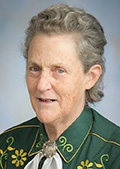 Scientist, inventor, teacher, and author Temple Grandin is a renowned animal expert and advocate for autistic communities. Diagnosed with autism as a child, Dr. Grandin credits her parents’ advocacy and early educational intervention as a factor in her success. Dr. Grandin has devoted her career to improving understanding and conditions for livestock and has designed numerous innovations to reduce stress for animals in handling facilities.
Scientist, inventor, teacher, and author Temple Grandin is a renowned animal expert and advocate for autistic communities. Diagnosed with autism as a child, Dr. Grandin credits her parents’ advocacy and early educational intervention as a factor in her success. Dr. Grandin has devoted her career to improving understanding and conditions for livestock and has designed numerous innovations to reduce stress for animals in handling facilities.
Pursuing her education at Franklin Pierce College and Arizona State University and culminating with her doctorate at the University of Illinois-Urbana, today Dr. Grandin is a professor of animal science at Colorado State University and the founder and consultant at Grandin Livestock Handling Systems.
Dr. Grandin is the recipient of a great number of industry awards over four decades, including the Animal Management Award, the American Society of Animal Science; Woman of the Year in Service to Agriculture, Progressive Farmer magazine; the Distinguished Alumni Medallion, National 4-H Council; the Humane Award, American Veterinary Medical Association; and the President’s Award, National Institute of Animal Agriculture.
A champion of “neurodiversity,” Dr. Grandin has been frequently featured in national media. Her story was depicted in a 2010 award-winning HBO film, as well as her memoir Thinking in Pictures and autobiography Emergence: Labeled Autistic. She is the author of over 400 articles and many books on autism as well as animal science, such as Animals in Translation: Using the Mysteries of Autism to Decode Animal Behavior and Animals Make Us Human. Her book, Calling All Minds, was a New York Times best seller for middle school students.
In 2017, Dr. Grandin was inducted into The National Women’s Hall of Fame. She is a fellow of the American Association for the Advancement of Science and the American Society of Agricultural and Biological Engineers.
Dr. Grandin will be receiving an honorary Doctor of Sciences.
Richard G. Lugar
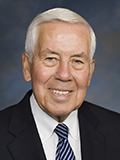 A fifth generation Hoosier, United States Senator Richard G. Lugar was the longest serving member of Congress in Indiana history, serving 36 years. Today he is President of The Lugar Center, a non-profit organization focusing on global food security, non-proliferation of weapons of mass destruction, aid effectiveness, and bipartisan governance. A professor of practice and distinguished scholar at the School of Global and International Studies at Indiana University, Senator Lugar also serves on the faculty at the University of Indianapolis, leading the Richard G. Lugar Symposium for Tomorrow’s Leaders.
A fifth generation Hoosier, United States Senator Richard G. Lugar was the longest serving member of Congress in Indiana history, serving 36 years. Today he is President of The Lugar Center, a non-profit organization focusing on global food security, non-proliferation of weapons of mass destruction, aid effectiveness, and bipartisan governance. A professor of practice and distinguished scholar at the School of Global and International Studies at Indiana University, Senator Lugar also serves on the faculty at the University of Indianapolis, leading the Richard G. Lugar Symposium for Tomorrow’s Leaders.
Following graduation from Denison University and study as a Rhodes Scholar, Senator Lugar served in the US Navy. Before election to the Senate, he helped manage the family’s food machinery manufacturing business and served two terms as mayor of Indianapolis.
In six Senate terms, Senator Lugar exercised leadership on critical issues of global food security, nuclear non-proliferation, energy independence, and free trade. He led actions to reduce the threat of nuclear, chemical and biological weapons. With then-Senate Armed Services Chairman Sam Nunn, efforts to destroy weapons of mass destruction in the former Soviet Union resulted in the deactivation of over 7,600 nuclear warheads once aimed at the US. As chairman of the Agriculture Committee, Senator Lugar initiated a biofuels research program to decrease dependency on foreign oil. Senator Lugar also played an instrumental role in enacting US sanctions on the apartheid government of South Africa.
In recognition of his many achievements, Senator Lugar received the American Foreign Service Association Lifetime Contributions to American Diplomacy Award, the J. William Fulbright Prize for International Understanding, and the rank of honorary Knight Commander of the Most Excellent Order of the British Empire. President Barack Obama bestowed on him the Presidential Medal of Freedom.
Senator Lugar also manages his family’s 604-acre Marion County, Indiana farm.
Senator Lugar will be receiving an honorary Doctor of Laws.
Denis Mukwege
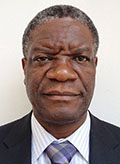 Physician, surgeon, and human rights activist Denis Mukwege decided to study medicine while still a child in Bukavu, Democratic Republic of the Congo. Pursuing medical studies in Burundi and specialization training in France, he earned his medical sciences doctorate from the Université Libre de Bruxelles and returned home to practice in Lemera, where medical care access was severely limited. Enduring a 1996 attack in which hospital personnel were killed, Dr. Mukwege went into exile but soon returned, and in 1999 founded the Panzi Hospital at Bukavu.
Physician, surgeon, and human rights activist Denis Mukwege decided to study medicine while still a child in Bukavu, Democratic Republic of the Congo. Pursuing medical studies in Burundi and specialization training in France, he earned his medical sciences doctorate from the Université Libre de Bruxelles and returned home to practice in Lemera, where medical care access was severely limited. Enduring a 1996 attack in which hospital personnel were killed, Dr. Mukwege went into exile but soon returned, and in 1999 founded the Panzi Hospital at Bukavu.
Intended for maternity services, Panzi Hospital instead encountered tremendous numbers of victims of sexual violence committed by armed groups of many origins. Dr. Mukwege has assisted these survivors and women with severe gynecological issues for over two decades and has publicly advocated for the empowerment of Congolese women.
Internationally recognized for its holistic response to gender-based violence, Panzi Hospital has treated over 50,000 women and children. This pioneering model integrating psychological and medical care, legal assistance and socio-economic support has been implemented in countries across Africa. To extend the hospital’s outreach efforts, Dr. Mukwege established the Panzi Foundation in 2008.
Despite a 2012 assassination attempt, Dr. Mukwege remains an outspoken advocate on behalf of sexual violence survivors. His efforts have brought greater global attention to the crimes of sexual violence as a weapon of war. Calling on the international community to hold perpetrators to account, Dr. Mukwege continues to raise awareness of the need for quality health care for all, for women’s and human rights, and for peace.
In recognition of this work, he and Yazīdī activist Nadia Murad were awarded the 2018 Nobel Peace Prize. He has also received the United Nations Human Rights Prize, Sweden’s Olof Palme Prize, France’s Officier de la Légion d’Honneur, and the Seoul Peace Prize. In 2014, the European Parliament unanimously elected him the Sakharov Prize Laureate, its highest honor.
Dr. Mukwege will be receiving an honorary Doctor of Sciences.
Laurie Olin
 Laurie Olin is a distinguished teacher, author, artist and one of the most renowned landscape architects practicing today. Known for his award-winning “people-centric” landscapes gracing cities around the world, Mr. Olin is Practice Professor Emeritus of Landscape Architecture at the University of Pennsylvania’s School of Design, where he taught for over 40 years.
Laurie Olin is a distinguished teacher, author, artist and one of the most renowned landscape architects practicing today. Known for his award-winning “people-centric” landscapes gracing cities around the world, Mr. Olin is Practice Professor Emeritus of Landscape Architecture at the University of Pennsylvania’s School of Design, where he taught for over 40 years.
As founding principal of the Philadelphia-based OLIN, he has guided signature projects, such as re-design of the Washington Monument Grounds in Washington, DC, for which Mr. Olin won the Design Honor Award from the American Society of Landscape Architects. Other notable projects include New York City’s Bryant Park, the Getty Center in Los Angeles, and recently, the award-winning Barnes Foundation in Philadelphia and Apple Park in Cupertino, California. For over four decades, Mr. Olin has also contributed significantly to the master planning and development of the University’s campus.
A native of Alaska, Mr. Olin studied civil engineering at the University of Alaska and architecture at the University of Washington. The former chair of the department of landscape architecture at Harvard University and a Guggenheim Fellow, Mr. Olin has written widely on his field, including co-authoring OLIN: Placemaking, a selection of his studio’s most celebrated projects.
In 2018, the School of Design’s Architectural Archives honored Mr. Olin with an exhibition reflecting seven decades of work, including drawings, sketches, and observations from the world over.
Mr. Olin is a Fellow of the American Academy of Arts and Sciences and of the American Society of Landscape Architects. In recognition of his work, he has received the Award in Architecture from the American Academy of Arts and Letters, and the 2012 National Medal of Arts. He also holds the 2011 American Society of Landscape Architects Medal, the Society’s highest award for a landscape architect. The National Building Museum presented to him the 2017 Vincent Scully Prize in recognition of his contributions.
Mr. Olin will be receiving an honorary Doctor of Arts.
Neville Earl Strumpf
 Neville Strumpf is a renowned expert in the nursing care of older adults. Until her retirement in 2008, she served as professor of nursing at the University of Pennsylvania’s School of Nursing, where she is also a former interim dean. Since her arrival at Penn as assistant professor in 1982, Dr. Strumpf’s leadership, innovative scholarship, teaching excellence, generous mentorship and service in the University community and beyond have drawn the deep admiration of her peers.
Neville Strumpf is a renowned expert in the nursing care of older adults. Until her retirement in 2008, she served as professor of nursing at the University of Pennsylvania’s School of Nursing, where she is also a former interim dean. Since her arrival at Penn as assistant professor in 1982, Dr. Strumpf’s leadership, innovative scholarship, teaching excellence, generous mentorship and service in the University community and beyond have drawn the deep admiration of her peers.
Under Dr. Strumpf’s leadership, Penn Nursing was among the first to integrate gerontology into the undergraduate curriculum. For 15 years, she directed the School’s nationally top-ranked Gerontology Nurse Practitioner Program. She also founded and was director of the School’s Center of Gerontologic Nursing Research and its Hartford Foundation Center of Geriatric Nursing Excellence. Dr. Strumpf is also former chair and advisory board member of the School’s Barbara Bates Center for the Study of the History of Nursing. Among other leadership roles as a Penn faculty member, Dr. Strumpf served the University community as chair of the Faculty Senate.
Her work with research partner Dr. Lois Evans yielded the first ever clinical trial of its type, demonstrating that routine use of physical restraints was dangerous for older people. These findings contributed to groundbreaking national legislation, altered standards of care, and revolutionized practices in nursing homes and hospitals in the United States and the world.
In retirement, Dr. Strumpf remains passionately engaged in improving the lives of older people, including board membership for the Mercy Life West Philadelphia PACE Program and as president of the Board of Ralston Center, a provider of services to older adults in West Philadelphia.
Her many awards include Penn’s Lindback Award for Distinguished Teaching; Honorary Alumna of Penn’s School of Nursing; Distinguished Alumna Award, NYU Division of Nursing; the Claire M. Fagin Distinguished Researcher Award at Penn, and Nurse Researcher Hall of Fame, Sigma Theta Tau International. Dr. Strumpf is a Fellow of the American Academy of Nursing and the Gerontological Society of America.
Dr. Strumpf will be receiving an honorary Doctor of Sciences.
Jill Cornell Tarter
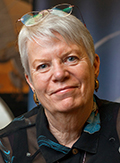 Astronomer Jill Tarter is the Emeritus Chair for SETI (Search for Extraterrestrial Intelligence) Research at the SETI Institute in Mountain View, California. Dr. Tarter has spent much of her career, spanning more than four decades, attempting to answer the age-old human question, “Are we alone?” by searching for evidence of technological civilizations beyond Earth. Dr. Tarter and her groundbreaking work were introduced to the public when actor Jodie Foster portrayed a character inspired by Dr. Tarter in the 1997 film Contact.
Astronomer Jill Tarter is the Emeritus Chair for SETI (Search for Extraterrestrial Intelligence) Research at the SETI Institute in Mountain View, California. Dr. Tarter has spent much of her career, spanning more than four decades, attempting to answer the age-old human question, “Are we alone?” by searching for evidence of technological civilizations beyond Earth. Dr. Tarter and her groundbreaking work were introduced to the public when actor Jodie Foster portrayed a character inspired by Dr. Tarter in the 1997 film Contact.
When undertaking undergraduate studies in engineering physics at Cornell University, Dr. Tarter was the only woman of 300 engineering students. She went on to receive her master’s and PhD in astronomy from the University of California, Berkeley. Her success as a female scientist has served as a role model for generations of women in science.
Dr. Tarter has served as Project Scientist for NASA’s SETI program, the High Resolution Microwave Survey, and has conducted numerous observational programs at radio observatories worldwide. Since termination of funding for NASA’s program in 1993, she has served in a leadership role to design and build the Allen Telescope Array and to secure private funding to continue SETI exploratory science. The author of more than 170 technical papers, Dr. Tarter lectures extensively both on the search for extraterrestrial intelligence and the need for proper science education.
Dr. Tarter is a Fellow of the American Association for the Advancement of Science, the California Academy of Sciences, and The Explorers Club. She is the winner of the 2009 TED Prize, and in 2012, she was named one of the Time 25 in Space. She was the 2014 Jansky Lecturer and received a Genius Award from Liberty Science Center in 2015. Dr. Tarter served as president of the California Academy of Sciences and was awarded a Lifetime Achievement Award by Women in Aerospace. The Asteroid 74824 Tarter (1999 TJ16) was named in her honor. A biography of Dr. Tarter, Making Contact, was published in 2017.
Dr. Tarter will be receiving an honorary Doctor of Sciences.
President’s Badge of Office
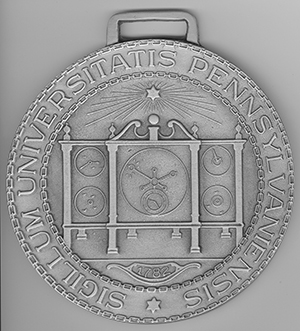 The President wears as a badge of office a silver medallion of which one face is engraved, like the mace, with the University seal. The obverse (at right) of the President’s medal bears the “orrery seal,” designed in 1782 by Francis Hopkinson, A.B. 1757, a signer of the Declaration of Independence.
The President wears as a badge of office a silver medallion of which one face is engraved, like the mace, with the University seal. The obverse (at right) of the President’s medal bears the “orrery seal,” designed in 1782 by Francis Hopkinson, A.B. 1757, a signer of the Declaration of Independence.
